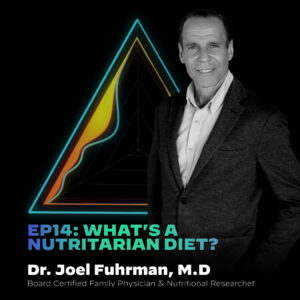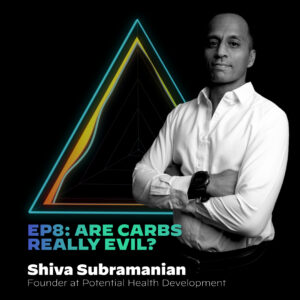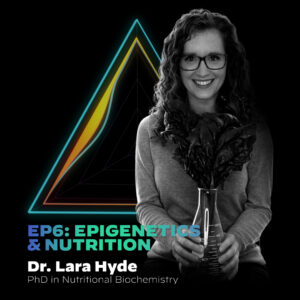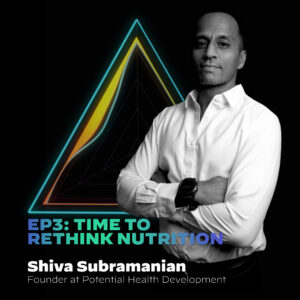Introduction Of Podcast
What is gut? What are its functions? And how can it affect your metabolic health? Mohit & Shiva are here to answer these questions. Jump right in.
Timestamps
- (00:00 – 01:07) – Introduction
- (01:27 – 06:15) – Role of The Gut in Metabolic Health
- (06:26 – 08:10) – Gut Diversity
- (08:13 – 11:07) – Gut Microbiome and Food Response Variability
- (11:15 – 13:04) – Microbiome Plasticity
Key Takeaways – Transcripts
Intro (Mohit): An interesting fact that I recently read about our gut is that about a 100 trillion bacteria, both good and bad, live inside a digestive system. 100 trillion in dollars is a figure that the world economy is expected to exceed in 2022. When put into context, there are about hundred trillion cells that make up the entire human body. It seems fascinating that a large part of the human body is actually made up of the microbiome that we talk about. And what we think as being non microbiome seems visibly non-microbiome is very very less as a component of our entire being. Our gut plays such a critical role in our functioning, and yet we sometimes don’t realize the gravity of the matter as we are engaged in our day-to-day routine. That could also be because we sometimes overestimate things that are visible and underestimate things that are invisible. Hi, I’m Mohit Kumar, and in today’s episode, Shiva and I dig into everything under the sun about our gut and find out how most of our problems actually arise from poor gut health. Let’s get into it.
Question (Mohit): I think the microbiome your gut plays a mega role in terms of I think it’s both ways, right? I mean, it plays a mega role in terms of optimizing your metabolic health, but your state of metabolic health also drives your gut health in some ways. How does that equation actually work? And what is the simplest way to understand the role of the gut? What is the role that the gut actually plays? Where is it located? And what’s its impact on an individual’s metabolic health?
Answer (Shiva): I think when you talk about the gut, I think we really have to start at the mouth because the beginning of the gut is actually the mouth, if you ask me.
(Mohit): Well, that’s interesting. I think most of us start with the intestine, but yeah, it’s actually the mouth.
(Shiva): Yeah. Because if you think about it, it’s about a whole cephalic phase, right? Yeah. It’s how you imbibe food and all the interactions thereof from looking at the food onwards. And that’s why your gut starts. Because I think it’s this notion that we’ve disconnected the gut from the rest of our body is the problem. We just call it different because we think gut and we think a certain way. You can’t Netflix and chill. Basically it is a tube, a long tube that goes from all the way up here all the way out, and everything that happens in that is the gut. So it’s not a far cry to think why there’s gut brain access. It starts much closer to home than you think. Because think about it, your digestive phase starts with your digestive phase actually starts in the mouth with your saliva. That’s where the cues actually start. If you miscue their everything downward is going to be miscued, right? So the first thing I would change is to say the gut actually starts where your mouth starts because that’s the beginning of the tube. And the whole syphilic phase is like on how you look at food, how we consume it. And that’s why chewing becomes a big point. And if you don’t think about that, then if the food is not being churned down into having that bigger surface area, everything downwards is going to go into a problem. Does it also mean that foods that are harder to chew require some effort, trigger something else? Versus basically all the nerves of mastication, the trigeminal nerves here in your jaw, all the mastication is all done by the work of the jaw. But also, there’s so much of responses with the muscles in the jaw to your brain. I mean your windpipe storing all of that, right. Because it’s got so much to do with chewing. And that’s why people say chew 30 times. Hey, everybody knows this stuff, right? We’ve all heard it, we just forget it. Because with the speed of life you’re like, okay man, I’ll do five times. I’m not saying I do it either. This is like a tough one for me to look, this is what I said. The application of knowledge only when you apply it becomes wisdom. There are times I do it, there are times I don’t look, I struggle just like everybody else. Just knowing it makes no difference because you get into your habituations, there’s a certain way you eat, you go through it and you’re done. But actually, because we’re talking about it from an objective perspective, it has to start in the mouth. And there’s so much of interactions with this chewing because chewing itself is going to help all the cranial nerves that we just discussed. Swallowing, all of that is part of what we discussed earlier, right? It helps your face, it helps all the muscles in the face. It’s stimulating multiple nerves. So nerves that are next to each other fire each other. So again, I’m just talking about it as a continuum from our last conversation. We have to think about the gut starting here and the signals from here are going into your brain telling you what has to be digested. The acid then comes out of your stomach, so on and so forth. There has to be enough of it so that it kills any bad pathogens and the acid will have the equal continuum of bile so that the next part of the process goes on, so on and so forth. The fat metabolization and then it goes into the small intestine where the absorption process, the peptides and proteins are all broken down. The carbs are made into simpler forms. The fats go into a different system because they don’t go into the hepatic system, they actually go into your lymph, right? Because the fatty molecules can’t be carried in blood so they are actually encapsulated and they go into the lymphatic system and come out from there and it’s put back into your system from there. So if you really look at it, that’s just the beginning of the garden. That’s all the tools of fuel that go out. And then you have all the other amazing things the gut is doing because all the fibers go up when we create secondary metabolites, primary metabolites from all the foods. And these things have great amount of therapeutic value. Let’s look at this one. Serotonin. 80% of Serotonin is made in your gut. So if you think about that, that’s the one that makes melatonin. It’s your hormone for so many things. In terms of neuromodulation, there are microbiome.
(Mohit): There are microbes actually making Serotonin in our gut?
(Shiva): Yeah, out of the fiber. And everything else is coming in. I mean, that’s where your Serotonin is actually made, which is why you feel so crappy. When you actually have gut issues, it affects your mood, right? There are so many feedback loops. And that’s why I’m saying, like, when you talk about the gut and the microbiome, it’s all connected. And remember, the Vegas nerve goes all the way down. So the feedback loop is you got to think like it’s going up and down, up and down, up and down. It’s not like the brain is telling the gut what to do. It doesn’t work like that. This is a place where everyone’s boss and everyone’s talking, and the brain has to decide what to respond to, the greater the threat. Obviously, that’s what it’s going to respond to.
Question (Mohit): And there’s these factors that affect the nerve or your nervous response systems, response to the food or the environment also affect the gut. But then does your distribution or the type of diversity that they have in the gut, does it also affect the type of food response that you’re going to generate?
Answer (Shiva): 100%. You know, an interesting one. As you know, we went to an organic restaurant together where the food was just completely organic and we had an eight course meal. I’m just bringing this up and you know that you had no glycemic spike over there. Same food. Same food.
(Mohit): It was crazy. I was expecting a mega spike and I didn’t hold back while eating that meal. Nothing.
(Shiva): Okay, so another friend of ours actually did the same thing as, you know, in Europe, and he went to an organic restaurant and also went for a six course meal with one of the best chefs and had no glycemic spike. So what makes it interesting is that this is new feedback, right? I mean, this is us experimenting. And so what has actually told us was very interesting, that the amount of fertilizer, pesticide load being reduced actually caused less of a stress response in our gut and actually caused it to have less of a glucose spike, the better insulin sensitivity. Yeah. Amazing. And maybe it’s because the microbes, whatever, is working as a pesticide and on the ground is actually killing microbes. It would not be a far cry to think that the same thing is happening in the gut. While we consuming the food, because of some trace elements of it. Our efficiency levels comes down, the threat response goes up because now we are fighting the toxic load which we can deal with. It’s very small, but there is a small consequence then we were able to see on our glucose and we both went for that meal together, which means that it was really interesting that both of us had nothing. And I took you there because I had already experienced that before and I was in shock. And that was one of our learnings together. Again, experimenting in reality.
Question (Mohit): that’s the environment of food driving your response is there also sort of like a response on the basis of your microbiome signature? Like for example, we often see this in Cyborg that I have a totally different response to black coffee compared to, let’s say somebody else essentially, right? Or for example, for me, rice response very differently compared to if I eat something with gluten. So why does that variability exist?
Answer (Shiva): I think it’s also, like you said, exactly what kind of microbiome the diversity definitely makes sense, but I think that it’s a more complex problem because we’re a hologenome. Our genetics are interacting with the genetics of the microbiome. In fact, we are a symbiotic creature, if you think about it. We have 10 trillion odd more bacterial species than our own human cells and we are constantly working together. Now, say that you don’t have the enzymes to break down wheat. Obviously you can only then have the flexibility of what diversity you have in your gut to be able to do that job for you. So say you don’t have that lactose persistence gene. So it’s milk, but your microbiome can take a bit of the bullet for you. So you may not have a problem and you have it with tea or a coffee, but drinking plain milk may give you a problem. So the microbiome is very interesting. It takes a lot of the burde
off, like making short chain fatty acids. We can’t really have that fiber. The fiber is actually fuel for the microbes and they make these short chain fatty acids which then we’re able to imbibe, right? It also helps our cycling of our enterocytes and everything else in our gut. So it’s a continuum. I think we have to look at this like the Oro Boris the Snake eating its own tail. It’s a continuous loop. It’s like very interesting. You’re not sure where the head is and the tail is it’s always a chicken and egg story over here.
(Mohit): You already have sort of like a partner in the body, essentially like somebody who is our DNA is different from the microbiome DNA. And even if, for example, in this case, if your genetic tests reveal that you are sensitive or allergic to a specific type of food, it might turn out in practicality because your microbiome is taking the load or the hit, you’re able to absorb it. That also means probably the other way around, right? If you don’t have the microbiome exactly, you’re not able to take that load exactly.
(Shiva): But you may have the genes for it. So see, there are so many variabilities in between, right? That’s the modulation. So say you can take lactates because you have the genes to be able to break it down. Good. Then it’s not so important that your microbiome has it. Otherwise it’s vice versa, right? It’s an interplay between the both.
(Mohit): One of these two should actually have this is why in most cases, like genetics being fixed, if microbiome is diverse or is different for different people, their food responses are going to be different and hence the glucose response as well. Because potentially the way they process food at the rate at which they process food is also going to be different.
(Shiva): Yes, the plasticity will definitely change, right? I mean, your microbiome plasticity, we can change every 48 hours, right? So what? We are also plastic. We have an epigenetic change, but our genes still express themselves much. Maybe we can’t change our genes particularly. There’s some modulation that we can do. We can change the epigenetic expression; we can work with the plasticity of a microbiome. There are many things that can influence in the environment and that’s how we’ve become such a sophisticated surviving mammal because it’s our activity of our brain. Right?
(Mohit): I think the biggest takeaway for me is the fact that it’s important to have a beginner’s mind when you’re looking at your own health and physiology. If you want to if you’re really curious about this and the fact that this is all dopamine generating all dopamine generating makes it all the more interesting fact that charges the destination browse the pursuit of better ways to get healthier or better ways to improve your lifestyle. That’s really cool and interesting. The fact that there will be thousands and thousands of companies in this space eventually lead to millions and millions of people who will be interested in doing something like this. I think we are, in a way, an era where people would naturally be more you can say people would want to take control of their health in their own hands, not in a negative way, but in a way that they become more aware or conscious not just about themselves, but also about others, understand other people and their problems in their scenario. Maybe when the environment right, all the things that you spoke about if I start optimizing my health today, there is no scenario where I don’t think about the environment. It can’t really happen that you are the pinnacle of your health and then the environment that you’re living in is shitty because these two are so interrelated. And that’s a huge reason why even if you don’t care about Mother Nature or Planet if you care about your own health, caring about the environment is probably a wise thing to do.
Outro (Mohit): You are now aware of the various nuances about our digestive system and how we can mindfully control our diet and work towards a healthy lifestyle. If you recently got into a good habit to control your food intake, do let us know about your experience, we’d love to hear from you. Reach out to us by tagging @UltrahumanHQ on Twitter and Instagram. If you love what you’re hearing from us, then share this podcast with your near and dear ones. See you around for the next one.








